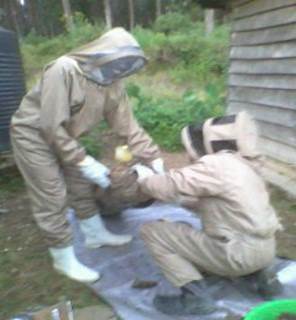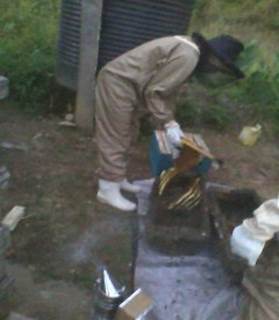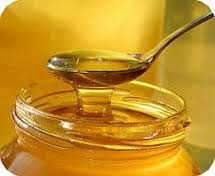Vleugels van Hoop |
||||||||||||||||||||||||||||||||||||||||||||||||||||||||||||||||||||||||||||||||||||
| Welcome - Who are we? - How to help? - Projects - Actions - Press New - Contact us - FAQ | ||||||||||||||||||||||||||||||||||||||||||||||||||||||||||||||||||||||||||||||||||||
|
||||||||||||||||||||||||||||||||||||||||||||||||||||||||||||||||||||||||||||||||||||
|
|
|||||||||||||||||||||||||||||||||||||||||||||||||||||||||||||||||||||||||||||||||||
N° |
Name |
Estimated cost |
Description |
1 |
Forest management and sustainable practices |
856.070 |
• Production of honey producing plants and fruit trees.
|
2 |
Livelihoods and economic development. |
2.960.500 |
Improvement of the quality and the quantity of the honey. (Purchase of modern hives) |
3 |
Management of the project |
1.124.065 |
• Equipment and operation of the team that manages the project: ' beekit ' (gloves, bones, lamp,...) |
4 |
Basic cost |
4.940.635 |
|
5 |
Unpredictable costs 7% |
345.845 |
|
6 |
General total |
5.286.480 |
|
Follow-up November 2012
Beekeeping |
|
|
CONCLUSION
Finally, the activities in the above projects carried out after consultation with the Vleugels van Hoop and with the advice from the local leaders.
The strengthening of capacity in the new project 'Beekeeping' will play a very important role in the region economically, social and environmental ; a sincere cooperation between all storekeepers may form the core of all good results of the activities.
Note that all current projects are followed up (weekly) which is hopeful for future, good results and plays a major role for human food administration in the protection against erosion in order to achiove sustainable development with guaranteed profit.
Follow-up of the project May 2013
Achieved result |
Problem |
Comment |
- Plantation of grains and plants |
- Too much rain from March till May |
To be able to reach our objectives we made 2 study trips to cooperatives specialize in beekeeping |
- Purchase of materials e.g. goves, boots, rasters, extractor, honey capturing recipients
|
There is only 1 shop in Kigali ; to get the mat acceptable costs we decided to import |
- purchasing of material has to happen in Dubai or Kenia as prices are significantly lower than at Api Business Developm. Cy. The outfits will arrive end of May. |
|
- There is not any modern unit close to Bweyeye |
Thanks to the cooperation of the members a calendar could be established in line with the strct order in which activities have to be done in the region of the Nyungwe forest |
Making available the hives and the materials |
|
The positioning of the hives is depending on the height, wind direction and position of the sun rise. |
Purchase book “Practical guide for beekeepers, basic knowledge beekeeping” |
Insufficient knowledge with the beekeepers |
The purchase of this book was essential to help us in the day to day activities |
Images
Click here to see the first images.
Report august 2013
Name project:
Improved beekeeping and setup of a modern unit of 100 hives which each can muster 25 kg honey a year in the region of the Nyungwe forest. (project 42)
General status:
In the general the status of the project “Beekeeping and setup of a modern unit of hives” is good, both related to tradiotinal as modern hives.
At the moment the project is focussing on:
- Gathering the weak colonies
- Introducing the waffled wax in the hives when the building up starts
- Distribution of the beehives
On top of this the educated beehive keepers, who work with the hives every day, can improve their beehives-stable, besides the modern beehive-unit, on the citrus fruits and eucalyptus to make the production more intense.
|
May |
June |
July |
August |
Traditional |
26 |
31 |
48 |
59 |
Modern |
10 |
17 |
25 |
35 |
Total |
36 |
48 |
73 |
94 |
|
|
|
|
|
Progress since last status report:
2 trainings were completed on:
- Quality of the honey reflecting the health of the bees
- Criteria for producing high quality honey
- Condition and needs of the honey-producers
Financial status:
For above mentioned activities and some others during the first month after project start, 71% of the financial means have been spend i.e. 71% of 3.507.850 RwFr
Problems/concerns:
- Low control of the modern technical treatment of the modern hives bij de beehive keepers
- Low knowledge of the farmers, about the role of the bees in the pollinisation and insufficient access for the beehive keepers to the orchards of citrus fruits
- The higher prices for the materials to store the honey and the honey culturing, in comparison with the prices in the initial project budget
- Lack of a digital camera to take pictures of all phases of the project in reporting
Attached documents (pictures, reçu’s,…):


Pictures of the beehive keepers, maintaining and monitoring the traditional beehives, building the modern beehives, applying the waffled wax when building up starts.
P.S. Receipts of made costs will be included in the next report from Bweyeye
Final report december 2013
Report on the visit of Vleugels van Hoop to Bweyeye (by Eustache Gatete)
The journey from Kitabi to Bweyeye started at 08h55. At Pindura, around 11 a ’clock, we left the asphalt paved road. Since the beginning of the trip we drove through the Nyungwe forest (nowadays called National Park of Nyungwe).
From Pindura to Bweyeye we crossed 30 km more in the National Park. After leaving the park we enjoyed the beauty of the hills around Bweyeye. We arrived in Bweyeye around 12h30. The welcome was very warm. The road towards the family of Joseph was decorated with banana leaves. This means in our culture “Welcome!”.
At arrival Joseph’s family offered us a drink, after which we started the main activity of the day: visiting the beekeeping project. On our way to the hives we met Joseph and could start our visit.
We did put on protective clothes and the adventure could begin. We got a general explanation from Damien, who is responsible for the daily follow-up. Afterwards we were witness of the harvesting from the traditional beehive. Unfortunately Bernadette was stabbed! Jean de Dieu, the guard, saved her. Unfortunately, seen the circumstances, she could not further follow the harvesting of the honey. Also Lut, who removed a glove to take pictures, was stabbed. To me this was a sign of “Welcome” as nobody else was stabbed.
Clic on the picture to visit the project

We returned to the car and took the harvest to the family. At arrival we could wash our hands and tasted the honey and afterwards we all enjoyed lunch. Keeping in mind their limited resources these people have outdone themselves. We were even offered banana beer. We had lively talks and exchanged ideas. My father took the floor and expressed the wish that God would bless the people of Vleugels van Hoop in all they are realising (with God in front of their way, followed by the Angels).


